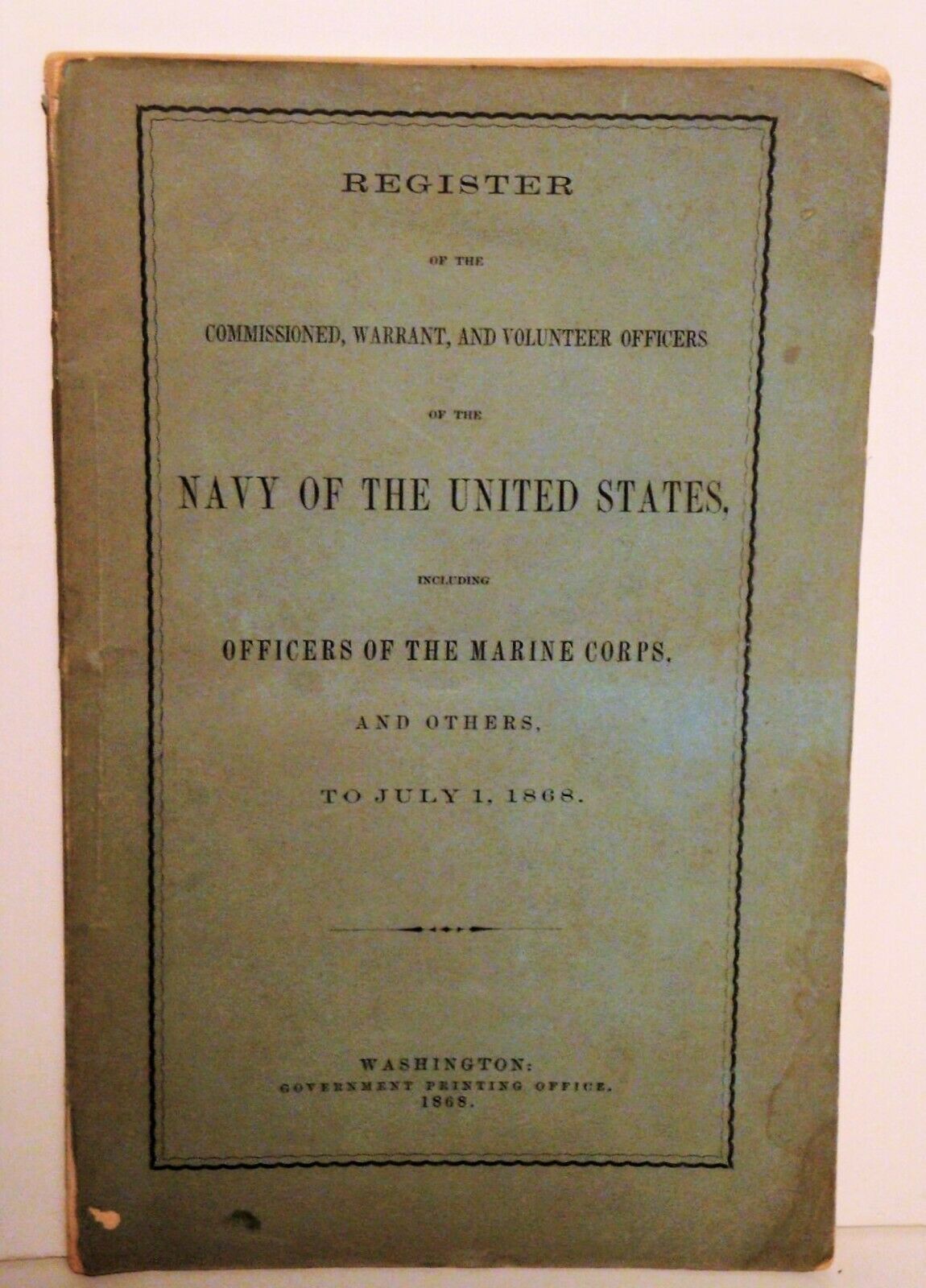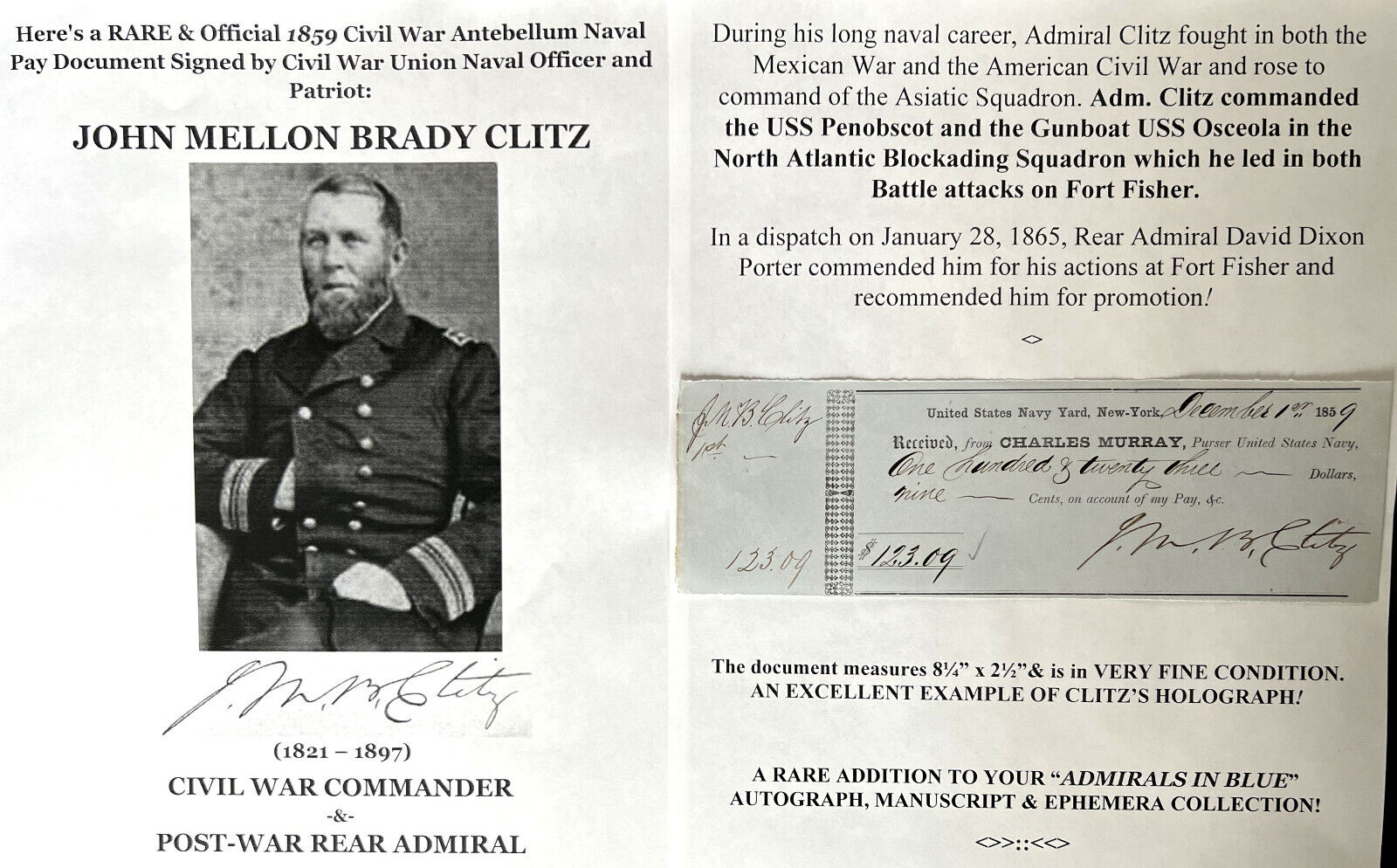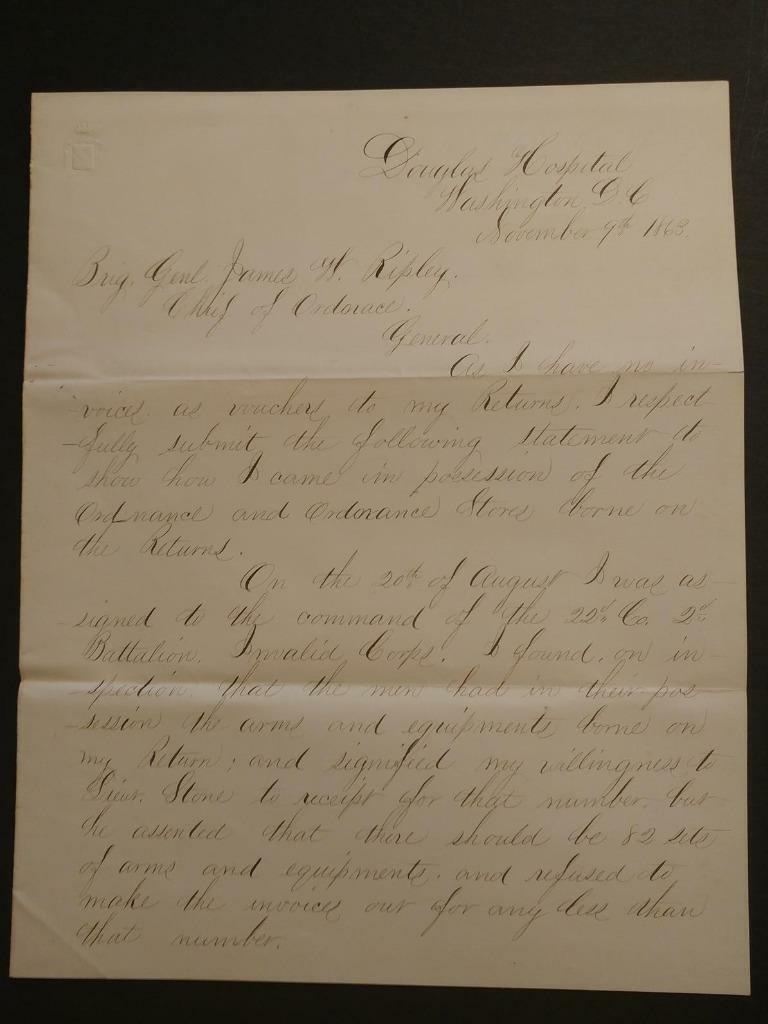-40%
INDIAN/CIVIL WAR MEDAL HONOR COLONEL 16th NY INFANTRY GENERAL DOCUMENT SIGNED VF
$ 36.95
- Description
- Size Guide
Description
JOHN CURTIS GILMORE(1837 - 1922)
CIVIL WAR CONGRESSIONAL MEDAL OF HONOR MAJOR and BVT COLONEL OF THE 16
th
NEW YORK INFANTRY FOR BRAVERY AT SALEM HEIGHTS, VIRGINIA DURING THE BATTLE OF CHANCELLORSVILLE ON MAY 3, 1863 - CAPTURING THE COLORS OF HIS REGIMENT and GALLANTLY RALLYING HIS MEN UNDER A VERY SEVERE FIRE,
LT. COLONEL OF THE 193
rd
NY INFANTRY,
INDIAN WARS LT. COLONEL FIGHTING INDIANS ON THE WESTERN FRONTIER
&
SPANISH-AMERICAN WAR BRIG. GENERAL and CHIEF OF STAFF TO LT. GENERAL NELSON A. MILES!
<>>
::
<<>
HERE’S A RARE INDIAN WARS ERA DOCUMENT SIGNED BY GILMORE – “
SPECIAL ORDERS, No. 138, HEADQUARTERS OF THE ARMY, ADJUTANT GENERAL’S OFFICE,
” 1p., DATED AT WASHINGTON, JUNE 17, 1891.
THE ORDER READS:
“…
By direction of the Secretary of War the following named officers are relieved from their present duties in the Division of the Atlantic, and will proceed to join their regiment in the Division of the Pacific:
Captain
Joshua A. Fessenden
*
, 5
th
Artillery
…By Command of Major General Schofield…”
In manuscript red ink at the bottom margin of the document: “Captain Fessenden, thru Hdqrs. Div. Atlantic”
*
JOSHUA ABBE FESSENDEN
(1841 – 1908)
CIVIL WAR WIA BVT CAPTAIN 5
th
US ARTILLERY- BATTLE OF CHICKAMAUGA HERO
&
POST-WAR MAJOR, US ARMY.
The document measures 8” x 10” and is in very fine condition.
<>>
::
<<>
BIOGRAPHY OF GENERAL JOHN C. GILMORE
John Curtis Gilmore
was born on April 18, 1837 in Canada. Later that year his parents moved across the border to Louisville, New York. He graduated from the Albany, New York, Law School and was living in Potsdam, New York at the start of the war.
On May 15, 1861, he became captain of Company F of the
16th New York Infantry
. He was brevetted major on September 29, 1862 for “gallant and meritorious service” at Antietam and lieutenant colonel for “gallant and meritorious service” at Fredericksburg.
He earned the Medal of Honor on May 3, 1863, at the Battle of Salem Heights, Virginia during the Chancellorsville Campaign. According to the citation he “Seized the colors of his regiment and gallantly rallied his men under a very severe fire.” He received the medal on October 10, 1892.
Gilmore mustered out at the expiration of his term on May 22, 1863. In March of 1865 he was appointed lieutenant colonel of the
193rd New York Infantry
, and mustered out with his regiment in January of 1866.
Gilmore was commissioned 2nd lieutenant in the 12th United States Infantry Regiment in May of 1866. He transferred to the 30th Infantry in 1866, was promoted to captain in the 38th Infantry in January of 1867, and transferred to the 24th Infantry in 1869. In August of 1890 he was promoted to major and assigned to the staff of the Adjutant General. He was promoted to lieutenant colonel in November of 1896.
In the Spanish-American War he served in Cuba and Puerto Rico as Chief of Staff to General Nelson A. Miles as Brigadier General of Volunteers. In April of 1900 he was promoted to colonel in the United States Army.
Gilmore retired in April of 1901. He died in Washington, D.C. on December 22, 1922 and is buried in Arlington National Cemetery next to his wife, Harriet Louise Gilmore, and his son, Colonel John Curtis Gilmore, Jr..
<<>
::
<>>
The
16th New York Volunteer Infantry
(or
1st Northern New York Regiment
) was an
infantry
regiment
in the
Union Army
during the
American Civil War
.
Recruitment
The 16th New York Infantry was organized by company in small towns and the regiment was assembled in
Albany, New York
, originally under the name "1st Northern New York Infantry. The regiment mustered in for two years of service as the 16th New York Infantry on May 15, 1861, under the command of
Colonel
Thomas A. Davies. However, Regiments that formed later in the war and individual soldiers that reinforced the Regiment would serve three years.
Companies were principally recruited as follows: A at
Ogdensburg
, B and F at
Potsdam
, C and E at
Plattsburg
, D at
Gouverneur
, G at
DePeyster
, H at
Stockholm
, I at
Malone
, and K at
West Chazy
and
Mooers
.
The regiment was attached to the 2nd Brigade, 5th Division,
Army of Northeastern Virginia
from June 1861 to August 1861; Heintzelman's Brigade, Division of the Potomac to March 1862;
Slocum's
Brigade,
Franklin's
Division,
I Corps
to May 1862; 2nd Brigade, 1st Division,
VI Corps
to May 1863.
The regiment was originally armed with
model 1840
muskets. In July 1861 the state of New York replaced these with
Pattern 1853 Enfield
rifle muskets
.
Service
The 16th New York retreats with the Union Army after the Battle of Gaines's Mill
Mustered in at Albany, May 15, 1861, went into camp near Bethlehem and left the state for Washington on June 26. To
Alexandria
on July 11, from there to
Manassas
, where it was engaged but a very short time on the 21st and returned immediately after to Alexandria. On September 15, 1862, to
Fort Lyon
. The winter of 1861-62 was passed at Camp Franklin. Ordered to Catlett's Station April 6, 1862, but at once returned to camp; then ordered to
Yorktown
, where it arrived on May 3. In 1862 Major Joel J Seaver of the regiment presented the members of the regiment with
straw hats
. The regiment was in action at
West Point
, and at
Gaines Mill
, its loss being over 200 killed and wounded. Their straw hats stood out on the battlefield, making them targets for Confederate guns. The regiment was present through the remainder of that week of battle, but was not closely engaged, then encamped at Harrison's Landing until August 16, 1862, when it returned for a brief period to Alexandria. In the
Battle of Crampton's Gap
it was in the van and lost heavily; was held in reserve at
Antietam
; at
Fredericksburg
was posted on picket duty, and after the battle went into winter quarters near
Falmouth
. It shared the hardships and discomforts of the
Mud March
under
Burnside
and was active in the
Battle of Chancellorsville
, with a loss at
Salem Church
of 20 killed, 87 wounded and 49 missing. A few days were next spent at Banks' Ford, then a short time in the old camp at Falmouth, and on May 22, 1863, the regiment was mustered out at Albany. During its term of service, its loss was 112 men killed or mortally wounded and 84 deaths from other causes. The three years men were transferred to the 121st N. Y.
The 16th New York Infantry mustered out of service in Albany on May 22, 1863. The three-year men were transferred to the
121st New York
.
Casualties
The regiment lost a total of 213 men during service including 5 officers and 124 enlisted men killed or mortally wounded and 1 officer and 83 enlisted men who died of disease.
<
<>
>
Joshua Abbe Fessenden
(15 February 1841-24 June 1908) was a
US Army
lieutenant during the
American Civil War
who distinguished himself at the
Battle of Chickamauga
in 1863.
Biography
Joshua Abbe Fessenden was born in Rockland, Knox County,
Maine
in 1841, and he enlisted in the
US Army
during the
American Civil War
. He became a lieutenant and the second-in-command of Battery H of the
Army of the Potomac
, serving under
Howard Mather Burnham
. At the
Battle of Chickamauga
, Burnham was mortally wounded, and a dying Burnham told Fessenden to save the guns. Fessenden was shot in the hip, but he assumed command of the battery and rallied the troops, recaptured his artillery, and even captured a
Confederate
gun. Fessenden was mentioned in dispatches by Brigadier-General
John H. King
, and he died in
Stamford
, Fairfield County,
Connecticut
in 1908 at the age of 67.
Joshua Abbe Fessenden
Birth
15 Feb 1841, Rockland, Knox County, Maine, USA
Death
24 Jun 1908 (aged 67), Stamford, Fairfield County, Connecticut
Burial
Arlington National Cemetery
, Arlington, Arlington County, Virginia,
Plot
Section 1 Grave 96-A
Civil War Service Detail
Joshua Abbe Fessenden
Residence
Rockland
, Maine; 20 years old.
Enlisted on 10/19/1861 as a Sergeant.
On 10/19/1861 he mustered into "B" Co.
ME 1st Cavalry
He Resigned on 8/6/1862
On 9/6/1862 he was commissioned into
US Army 5th Light Artillery
(date and method of discharge not given)
(Subsequent service in US Army until retiring 01/03/1894)
Promotions:
2nd Lieut 9/6/1862 (As of 5th US Army Artillery)
1st Lieut 12/31/1862 by Brevet (Stones River, TN)
Capt 9/20/1863 by Brevet (Chickamauga, GA)
1st Lieut 11/30/1865
I am a proud member of the Universal Autograph Collectors Club (UACC), The Ephemera Society of America, the Manuscript Society and the American Political Items Collectors (APIC) (member name: John Lissandrello). I subscribe to each organizations' code of ethics and authenticity is guaranteed. ~Providing quality service and historical memorabilia online for over 20 years.~
WE ONLY SELL GENUINE ITEMS, i.e., NO REPRODUCTIONS, FAKES OR COPIES!












